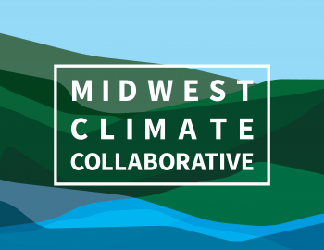By Sasha Zvenigorodsky
This story is part of a series on partnerships developed by the Midwest Big Data Innovation Hub with institutions across the Midwest through the Community Development and Engagement (CDE) Program.
Climate change—two words that have become increasingly popular throughout the scientific community as the world begins to see its destructive impacts across the globe. Though the rise in climate concerns for the future may appear to be a source of fear and uncertainty, many scholars, researchers, and academic organizations have regarded it as more of a call to action. This is where the Midwest Climate Collaborative (MCC) comes in.

The Midwest Climate Collaborative is headquartered at Washington University in St. Louis, Missouri, directed by Heather D. Navarro. This program is exclusive to a 12-state region in the Midwest and serves as a coordinating group for cross-sector responses to the ongoing climate crisis, with the objective of spreading knowledge about the issue as well as encouraging leadership and cross collaboration between various organizations to address the problem.
The MCC is a relatively new organization that was launched following the conclusion of a Think Tank series that was centered around outreach and engagement for climate action. By the end of the series, it was apparent that there is a plethora of great climate work being done across different institutions throughout the Midwest. Despite this, there are issues in their ability to connect and achieve collective success. Thus, participating Think Tank partners came together to craft strategies and objectives for the MCC, which was ultimately launched in January of 2022.
Throughout this past year, the MCC has established a variety of different strategic projects. One, launched in collaboration with the Midwest Big Data Innovation Hub (MBDH), is called the Climate Asset Map (CAM). This project has a goal of helping audiences such as researchers, practitioners, and community groups to easily access and contribute to climate action information that already exists in the region.
Currently, many governments and nongovernmental organizations (NGOs) local to the Midwest have limited resources to find and implement the latest climate research. The CAM serves to bridge this gap via an online, user-friendly interface. The assets of CAM could include data sets, research labs, training programs, and more. “Above all, I want this project to encourage people to invest in the Midwest,” says MCC Executive Director Heather Navarro.
As of now, the CAM group is moving forward in conducting a needs assessment survey with the help of a funded partnership with the MBDH. The needs assessment survey will help with the development of the CAM by determining which resources would be most beneficial for potential users to achieve success within their climate work. The survey results will be shared at the Midwest Climate Summit in February 2023, and will be distributed electronically over email and social media.
Although the fight against climate change is not an easy one, the MCC has worked as a catalyst to create a strong, interconnected Midwest region, which will certainly make it easier.
Get Involved
Contact the MBDH if you’re aware of other people or projects we should profile here, or to participate in any of our community-led Priority Areas. The MBDH has a variety of ways to get involved with our community and activities.
The Midwest Big Data Innovation Hub is an NSF-funded partnership of the University of Illinois at Urbana-Champaign, Indiana University, Iowa State University, the University of Michigan, the University of Minnesota, and the University of North Dakota, and is focused on developing collaborations in the 12-state Midwest region. Learn more about the national NSF Big Data Hubs community.
